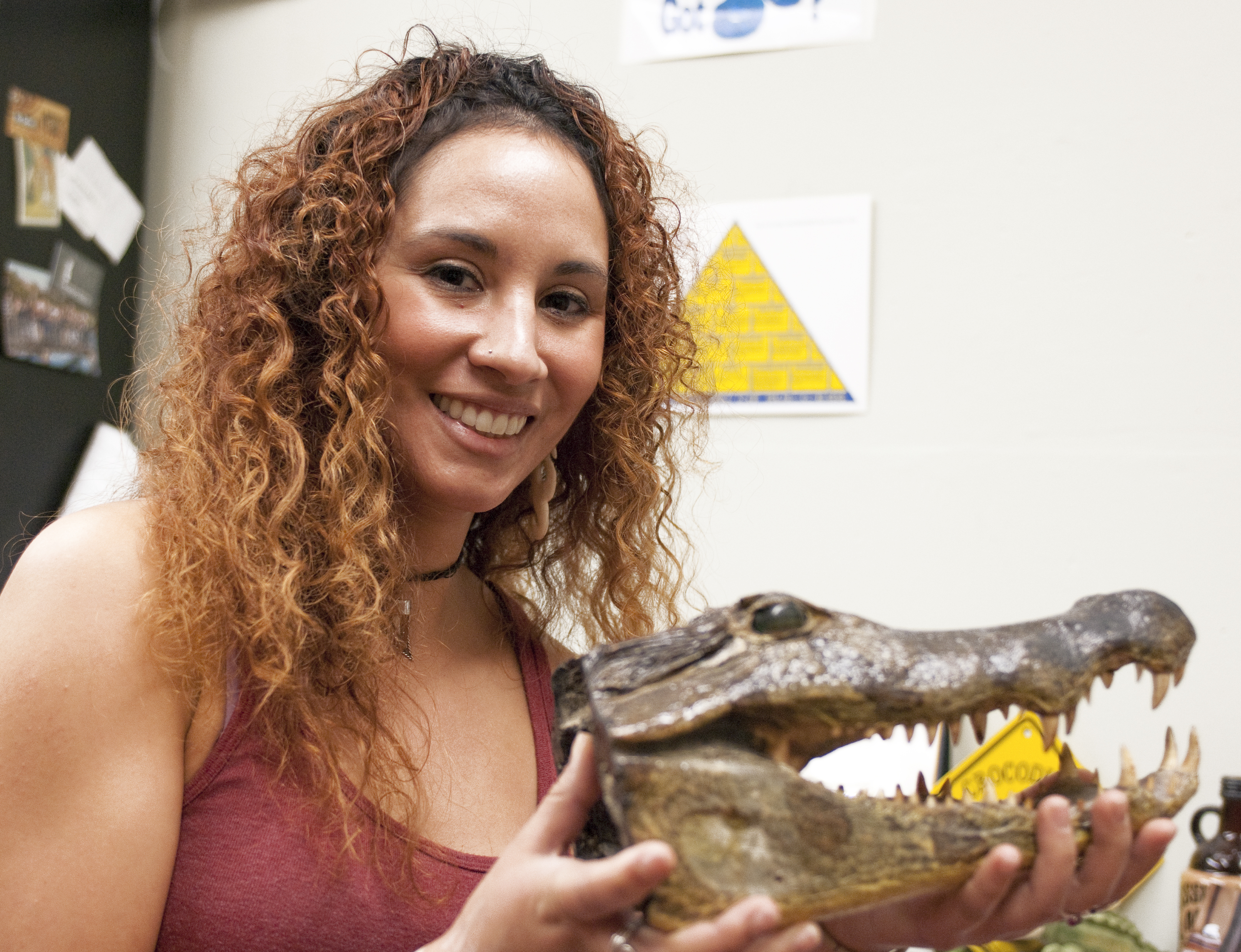
Marisa Tellez conducts research in Louisiana during the state’s annual alligator harvest.
Marisa Tellez spared two looks at her left hand minutes after it was bitten by a crocodile.
The first one was to see if her pinky finger was there. The second was to see if it was still attached to her hand.
It was, but Tellez, a graduate student in ecology and evolutionary biology, now jokes that her hand modeling days are over. The bite came four years ago when she was trying to move an abused Morelet’s crocodile into an enclosure in a Belizean sanctuary when it lunged at her.
The scars on her hand, and a crocodile tooth necklace around her neck, remind Tellez of that day. Far from terrifying her, she said the experience made her respect the animals even more ”“ which is important for her research in understanding the relationships between crocodiles, alligators and their parasites.
Her work, which is attracting attention, has taken her to Louisiana and Belize. Both places have been a change in lifestyle ““ Tellez grew up in Los Angeles.
She laid the foundation for her research by taking parasitology classes at UC Santa Barbara as an undergraduate. On the crocodile side, Tellez was inspired by the later conservationist Steve Irwin.
“I just put the two together,” Tellez said.
She also has always been interested in apex predators, who are at the top of the food chain, from a young age.
Her family almost expected that she take an adventurous path in life, said her mother, Laura Tellez. Some of her family even call her a “Crocodile Hunter.”
“There was part of me as a mom that thought she was a little bit crazy, and I was afraid for her just because of the animals she deals with,” Laura Tellez said.
Ever since she started her graduate work at UCLA, Marisa Tellez has gone to Louisiana during its annual alligator harvest to see how environmental and anthropogenic impacts affect alligator parasites.
Most of the research done on alligator parasites consists of the documentation of different species. Tellez said she is one of the first to extensively attempt to understand the relationship between the alligator and its parasites.
“It’s weird because you have this animal that has been around for 200 million years, and it’s like their physiology and behavior is doing something right, where they’ve been able to survive in the naturally changing environment for this long,” Tellez said.
From the apex predator such as the alligator, it is possible to make inferences about the rest of the environment, like an umbrella effect, Tellez said.
Tellez is currently collecting data on the extent of oil dispersal after the Deepwater Horizon oil spill of 2010. Scientists normally see an increased number of parasites called nematodes after an oil spill, Tellez said. By tracking the number of nemotodes in alligators in southern Louisiana, Tellez is trying to prove how far inland the oil had actually dispersed, and its effects on the state’s wildlife.
She is receiving support from many Louisiana natives who rely on the alligator and other wildlife as a source of food and income, said Donald Buth, professor of biology and Tellez’s doctoral adviser.
“She relates to people,” he said. “She’s not an ivory tower kind of person in that she’ll talk to the locals and explain what she’s doing to keep them informed.”
Tellez has been approached with numerous collaboration requests, including one to see how the alligator and crocodilian immune system fights or neutralizes parasites and viruses like HIV and West Nile. She hopes to take her findings over to the human medical field to see what researchers can learn from the crocodilian immune systems.
Tellez said though she is still getting used to being called in for collaborations as an expert, she is excited for her future work.
“I feel like I’m starting to feel like what I’m doing is actually going to contribute to something,” Tellez said.
Buth said her passion is contagious.
“There are certain people, and I’m not included in this, who are just parasite fanatics,” Buth said. “She is the real thing, the real parasitologist, in that she is so enthusiastic about it that she tries to inspire others to study it as well.”
He also said that she is the kind of student that goes at such high gear that he sometimes needs to tell her to pull back.
But experiences like the Morelet’s crocodile have taught Tellez where her limits lie.
“I started to get cocky and then I got bit,” Tellez said. “Now I’m more careful and now I’m more smart. I know my limits now.”
